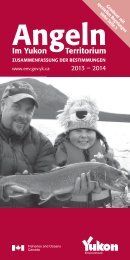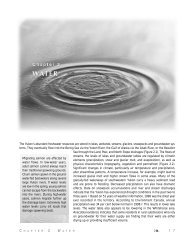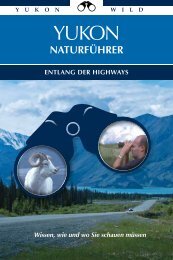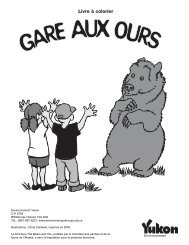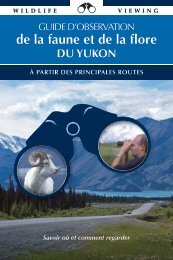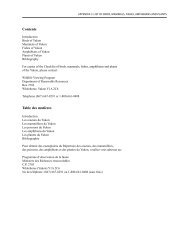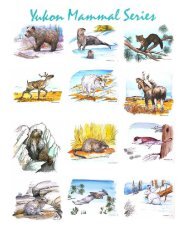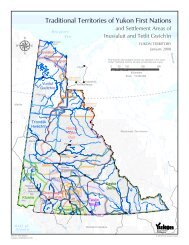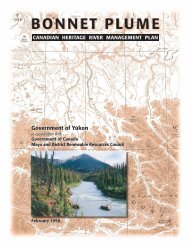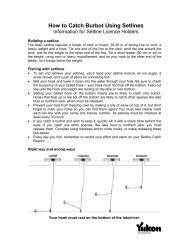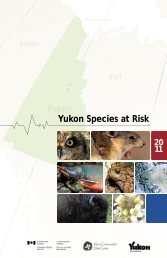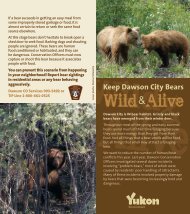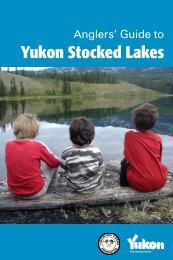Ch. 3 Land - Environment Yukon
Ch. 3 Land - Environment Yukon
Ch. 3 Land - Environment Yukon
You also want an ePaper? Increase the reach of your titles
YUMPU automatically turns print PDFs into web optimized ePapers that Google loves.
litter and garbage, mentioned by<br />
13 per cent of river travelers 10.<br />
Clean-up along heavily used rivers<br />
such as the <strong>Yukon</strong> River is undertaken<br />
periodically.<br />
“There’s one spot on the Canol<br />
Road where our family gathered<br />
and built shelters. Now the<br />
people that travel along that road<br />
are going down to the lake and<br />
the houses that we built there<br />
have been destroyed by bullets<br />
and the wood used for fires. The<br />
poles that we gathered for setting<br />
up our tents and the poles that<br />
we used to dry out our meat are<br />
all burnt up by the people that<br />
come through that way.”<br />
–<strong>Ch</strong>arlie Dick, Ross River<br />
First Nation Elder<br />
Ross River Elder <strong>Ch</strong>arlie Dick still lives<br />
a traditional way of life. As more and<br />
more visitors use Quiet and Lapie<br />
Lakes to access recreational and<br />
wilderness areas like the Big Salmon<br />
River, these types of conflicts may<br />
increase.<br />
The winter use of rivers and trails by<br />
recreational users on snowmachines<br />
and dogmushing appears to be increasing.<br />
Impacts of the increase in use of<br />
winter trails is not well understood.<br />
Extensive trail networks, increased noise<br />
and traffic may impact wildlife.<br />
With more people, there is more<br />
potential for people/bear interactions as<br />
has been experienced in the last few<br />
years in Kluane, on the Snake River,<br />
and in northern British Columbia at<br />
the Liard Hot Springs. Bears are attracted<br />
by garbage, become dangerous and<br />
occasionally have to be destroyed.<br />
Harvesting of fish and wildlife without<br />
proper permits may further deplete<br />
fish populations that are already<br />
under stress.<br />
Related Legislation and<br />
Educational Programs<br />
To protect the natural resources<br />
important for tourism, government and<br />
the tourism industry have been<br />
cooperating in a number of areas. The<br />
Wilderness Tourism Licencing Act came<br />
into effect in May 1999. To obtain a<br />
licence, wilderness operators are<br />
required to pay a $100 annual fee, get<br />
public liability insurance, meet worker<br />
compensation standards and have<br />
standard first aid training for all<br />
guides. To maintain a licence requires<br />
compliance with low impact camping,<br />
waste disposal standards and trip<br />
reporting. The <strong>Environment</strong> Act<br />
prohibits littering on all public lands.<br />
Other initiatives include placing environmental<br />
messages in the media and<br />
advertising the “No Trace <strong>Ch</strong>ecklist”.<br />
The leave no trace philosophy is<br />
becoming the wilderness tourism<br />
industry standard. The No Trace <strong>Yukon</strong><br />
program was initiated in 1998 and the<br />
first No Trace <strong>Yukon</strong> instructor’s course<br />
was delivered in 1999 through joint<br />
sponsorship of Renewable Resources,<br />
<strong>Yukon</strong> College and the National Outdoor<br />
Leadership School. Production of<br />
additional awareness materials and<br />
program development to promote and<br />
support minimum impact backcountry<br />
recreation is ongoing.<br />
The “Into the <strong>Yukon</strong> Wilderness”<br />
brochure is available in English, French,<br />
German and most recently Japanese<br />
13. This guide is distributed widely in<br />
visitor reception centres, Renewable<br />
Resources offices and in response to<br />
visitor inquiries. <strong>Yukon</strong> Tourism and<br />
the industry regularly take them into<br />
the marketplace. The <strong>Yukon</strong> Vacation<br />
Guide and other tourism promotion<br />
information contain instructions on<br />
the safe and wise use of the <strong>Yukon</strong>’s<br />
wilderness.<br />
Highway travelers also require services<br />
including effluent dumping and waste<br />
disposal. The <strong>Environment</strong> Act prohibits<br />
the discharge of holding tanks except at<br />
designated sites and littering on all public<br />
lands. The government is working to<br />
provide suitable effluent dumping sites<br />
where communities have problems<br />
handling the eduction sewage volumes.<br />
PROGRESS & CHALLENGES<br />
Progress since 1995<br />
■ The Wilderness Tourism<br />
Licensing Act came into effect<br />
in May 1999 with requirements<br />
for wilderness guides and<br />
operators and responsibilities<br />
for clients in leave no trace<br />
camping and waste disposal.<br />
■ “Into the <strong>Yukon</strong> Wilderness”, a<br />
<strong>Yukon</strong> government brochure is<br />
available for all <strong>Yukon</strong> visitors.<br />
■ Continued efforts of industry<br />
(Wilderness Tourism<br />
Association) to help members<br />
and others in the industry<br />
to recognize the value of<br />
wilderness and treat it with<br />
the respect it deserves.<br />
■ Implementation of the<br />
“No Trace <strong>Yukon</strong>” Program.<br />
<strong>Ch</strong>allenges<br />
■ Increased human/bear<br />
encounters.<br />
■ Greater use (by visitors and<br />
residents) of <strong>Yukon</strong> rivers in<br />
the absence of management for<br />
most of the high use river<br />
corridors.<br />
6 8 ❧ Y U K O N S T A T E O F T H E E N V I R O N M E N T R E P O R T 1999



